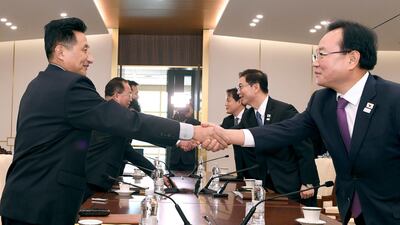On November 29, 1987, Korean Air Flight 858 exploded in mid-air, scattering human remains and plane debris into the Andaman Sea below. Two North Korean operatives had planted a bomb on the passenger jet – from Baghdad to Seoul – before disembarking at a stop-over some hours earlier. All 115 passengers and crew died in the blast. One bomber who survived a suicide attempt later testified as to the motive: to destabilise the South Korean government and scare athletes away from the 1988 Seoul Summer Olympics.
This month, the Games have become the backdrop for renewed North-South diplomacy. Following fresh sanctions imposed in the wake of Kim Jong-un's latest missile test last November, the recent talks have yielded rare tangible results. Next month, a North Korean delegation will attend the 2018 Winter Olympics in Pyeongchang, some 80 miles south of the demilitarised zone. With athletes joined by 230 cheerleaders and 140 orchestral musicians, this is among the largest exodus from North to South in years. Notably, the countries will march under one flag and field a joint women's ice hockey team. As a result, the cross border road will open for the first time in two years.
As ever, the reasons for what Japanese foreign minister Taro Kono has dubbed a North Korean "charm offensive" can only be divined. Some see an attempt to divert attention from Kim's nuclear programme. Others, including US secretary of state Rex Tillerson, have chalked it up to recent biting sanctions. Although his mercurial president is likely to take credit, many suspect a North Korean strategy to phase out the US, with whom South Korea usually holds military exercises in February. Seen by Pyongyang as a rehearsal for war, the exercises have been postponed until March – after the Olympics.
Historical precedent is not wholly encouraging. Having marched under one flag at the 2000 and 2004 Summer Games and the 2006 Winter Games, both sides subsequently reverted back to their posturing. But for now we should celebrate, with cautious scepticism, this sporting gesture. Meanwhile, the spectre of US-South Korea military exercises looms large, likely to set the trend of the post-Olympics proceedings, when any whisper of rapprochement will really be tested.

